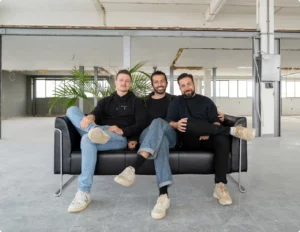Ideally, To Boost Innovation Spirit, You Would Allow Your Staff To Go Away For Three Months And Work With A Startup

Observing the ongoing trend of corporates, also locally, investing in innovation and even opening up towards startups (not only for PR reasons), some months ago, we started looking for companies that have some experience with this. Through the investment fund Eleven Ventures, which is currently facilitating the Visa Innovation Program in Bulgaria and aiming to help fintech startups and financial corporates find a common language and common ground, we came to United Bulgarian Bank (UBB) as one of the players with experience and good practices. UBB which was acquired by Belgian KBC Group two years ago is one of those companies that put effort into corporate innovation, also by transferring group level know-how to Bulgaria. In May, the group launched a Bulgarian branch of its innovation lab SurfStudio@UBB and SurfStudio@DZI, which has already been operating successfully in Belgium, Ireland, the Czech Republic, Slovakia, and Hungary. For us, this was an indication there might be interesting innovation practices worth exploring. So we went to talk to Christof de Mil, the innovation leader at UBB.
Christof De Mil began his career at KBC Group in 1995. After ten years in various management positions in the Retail and SME branch network of the group. Since 2011, he has been a member of the Board of Directors of CIBANK, where he is responsible for Retail Banking, Branch Network, and Distribution Channels and Payments. Following the acquisition of United Bulgarian Bank by the Belgian financial group KBC Group in June 2017, Christof De Mil becаme a member of the Board of Directors and Executive Director of Finance of United Bulgarian Bank. He aligns this position with his role as the innovative leader of KBC Group in Bulgaria.
Trending Topics: Currently, corporate innovation and working with startups is becoming a trending topic for many established companies. Yet, everyone is talking first about the challenges. What is this all about?
Christof De Mil: Well indeed. It is obvious that innovative startups are bringing enriching solutions to the market which can surely be of help to larger corporates. Typically there is a symbiosis. Small startups bring agile, innovative solutions but lack a core customer base. Larger corporates are often slow(er) innovators but can bring stability and a large customer base to the cooperation.
Nonetheless, we observe a couple of obstacles that lead quite often to little success. The first one is reputation which often related to the fear of the longer-term stability of the small startup. As a large corporate, you want to make sure that the new services or product you provide to your customers is still going to be around in six months.
Secondly, there are the processes and procedures which often are embedded in large corporates. Startups often fail to pass the rigid procedures of corporates, e.g. in the sphere of procurement, risk and compliance. Quite often the party stops there before it has even started.
Thirdly, there are governance and working style differences. Startups flourish in more freely organized structures with short and fast decision lines, whereas corporates have typical large and more hierarchic structures in which you need to pass several committees before getting any decision passed. This clash of corporate cultures often impedes the successful joint realization of innovative projects.
Last but not least there are also differences in the way large companies and startups look at financials. Where startups are often more interested in building a client base whilst even being unprofitable for a certain period of time, large corporates work with business cases in which short term positive profit and loss (P/L) impact is expected.

Is there any solution to such issues?
Each of the issues indicated above certainly has solutions and more and more you see both corporates and startups are overcoming those step by step. Like everything in life, all things start with knowing and understanding each other’s worlds.
So you see more and more corporates making attempts to be closer to the startup community. There is much broader participation of corporates in startup incubators and supporting initiatives.
I also observe that corporates are establishing separate governance models to enable and facilitate working together with startups: faster decision tracks, more agile and flexible set-ups of joint project teams, more flexible approaches towards procurement requirements and so on. In some cases, even separate joint companies – outside the walls of the large corporate – are created with the sole ambition to have joint innovation projects with startups.
On the other hand, startups understand more and more the need to deliver faster financial added value towards the corporate client, they are aware of security, compliance and other policies valid in larger corporates and accommodate to a certain extent to the different working environments.
Last but not least, we see more corporates moving from pure cooperation and partnership to having investment programs. It strengthens mutual connection and strives to work towards joint interests and goals.
What’s your experience and KBC’s in such situations?
We have experienced all the issues that I mentioned starting from the creation of awareness, policies, and governance which stimulates innovation and cooperation with startups within the organization.
Our best and most valuable experience is our KBC StartIT incubator program. StartIT is active in 4 of our markets and hosts over 500 startups active not only in the financial (Fintech) sector. We provide startups working space and professional advice. We work together with them on innovative solutions valuable for both us and the startup and we give them opportunities to interact with our large customer base.
Although the KBC group is not a VC, we’ve also invested ourselves in several startups. We are prudent in our investment approach, but if we see a real added value of going into joint investment-based cooperation, we do it.
What about the processes? How should a corporate structure the internal capacity to be able to eventually start working with startups? How are you preparing?
In my opinion, a couple of key elements – call them enablers – have to be put in place. The obvious one is the commitment to the C-level. Without that things will not fly and will not pass the highest decision levels.
On top of that, I believe the corporate needs to install a dedicated capacity to manage such relationships and to be the buffer between the internal process and outside players. You cannot allow 100 people starting to talk to startups all over the place, the process needs to be under certain control.
And then, of course, it’s a necessity to create an internal innovation spirit. It’s going to be quite a challenge to work with startups if the company is not innovative on the inside. Only when innovation starts to spark within the company, employees and managers will also start seeing opportunities and it will make sense to them to look around and spot potential partnerships.
Culture Eats Strategy For Breakfast: How Corporates Should Prepare For Innovation Alongside Startups
The fourth and very important element is to simplify governance. Even with dedicated people, if you don’t do it, it’s simply not going to work. Different decision levels, definitely different from those in the daily business, is what is required for every company willing to work with startups – they need to be fast and agile.
What’s the KBC experience? What is your strategy when it comes to innovation?
Well in KBC Group, innovation is one of the cornerstones of our strategy and day-to-day work. Not innovating in a sector like the financial sector – where many newcomers but also the GAFA are entering the game – is a recipe for disaster. KBC was recently awarded as one of the most innovative companies in the financial sector and UBB recently was granted with both the Nielsen innovation product of the year award and the B2B Innovation of the year prize. So we are kind of proud that our innovative solutions are also noticed and appreciated by the market and by our customers.
As a group, we have dedicated people, governance, processes, and budgets to support innovation. This program is driven by local initiatives of all the entities of the KBC group, including Bulgaria but at the same time tries to find synergies by smart copying ideas and solutions. Because let’s be honest, the digital world has no borders. Innovative solutions can in many cases be applied everywhere. So why invent the wheel in all our operations?
Where do you see the conflict between innovation, intrapreneurship, and corporations?
That conflict arises in several ways. It is not easy to create an innovation-driven corporate culture and spirit in large corporates. Typically employees are overwhelmed with day-to-day activities, hindered by heavy processes and legacy systems and we always have something more urgent to do than talking to startups and thinking of innovation.
However, I do believe it is crucial to spark innovation from within. I do believe you need an innovation team that coordinates and guides innovation efforts, but in essence, innovation could and should come from everybody within the company. Corporates really need to stimulate a culture of creating intrapreneurs.

Recently I talked to the head of Innovation of a large multinational in food and beverages. His vision on how to go about innovation is 3-layered. The first level is called “innovation we know of” – this is everything that we know as corporate today but which we can optimize and improve our own processes. The second level is “known to the world but not known to us” or things that exist but we don’t use them yet. Embracing those new solutions can create innovation from within. The third level is “new to the world” and means to really reinvent yourself. Level one and two can be done within the company if you have good governance, C-level support, and dedicated capacity. But reinventing yourself should – at least according to him – be done outside the company. For instance in dedicated innovation labs.
It is an interesting line of thinking. They dedicate their people to innovation and free them out of the company for a certain period of time because they believe that intrapreneurs need to be put out of the machine because this machine could kill their creativity. They continue paying them salaries, but let them work out of the corporate machine and develop this innovation spirit alongside with startups in the labs, or an SPV.
Corporate Innovation In Practice: 5 Models For Internal & External Experiments
How do you think this internal innovation spirit is created? How do you do it in KBC and UBB?
One thing we are doing, also locally, is the SurfStudio – our UBB and DZI innovation lab. Intrapreneurs are stimulated by a couple of things. We are trying to let people touch technology. People open up when they are in touch with new things. This is part of the concept in the Surfstudio. Based on this experience people start to be creative naturally. You need to inspire people. Secondly, you need to give people the freedom to create things. Having some governance in place, stimulating management to allow this innovation is also important.
The second activity of ours is to give people time and budget for innovation. Of course, we make sure to expose our people to startups, training, working with innovation groups. Believe me, it’s not always easy. Ideally what you would do is to allow your staff to go away for three months and work with a startup and bring in some ideas, but it’s hard to realize. In Bulgaria, we started that journey only last year, and if you see the spirit in the company compared to half a year ago – there’s a huge difference. People are interested and aware of what we do in terms of innovation and our SurfStudio innovation lab was awarded as Innovative idea of the year.
How big is your innovation team here?
Four people, it’s a small team responsible for innovation and strategy. But I don’t think we need more actually. I generally don’t believe innovation is created by a central team. You need one to coordinate and facilitate the process and create the right governance. But they are not the ones that will create all the innovations. If you put three people who are responsible for the innovation, you will create a mentality within the company that no one else is responsible or allowed to create new things. This will never work. People should know they are the ones that are expected to innovate, they are allowed and there’s a team that will support them. Probably the toughest battle to fight is to convince the managers to give their people time to create and innovate.




























